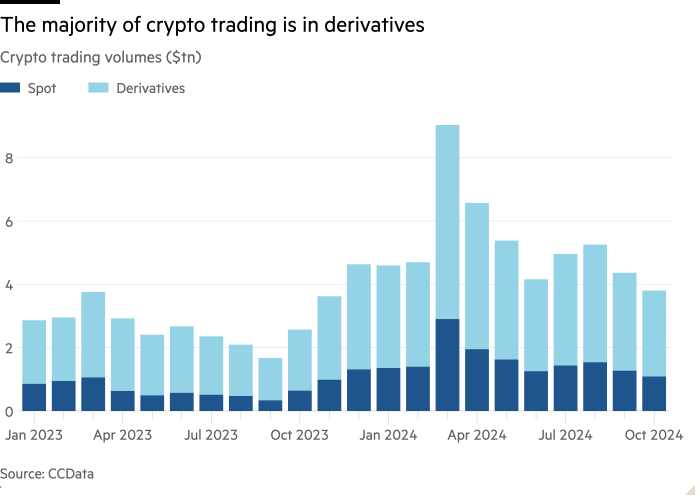
Stay informed with free updates
Simply sign up to the Cryptocurrencies myFT Digest — delivered directly to your inbox.
Crypto trading venues are expanding rapidly into derivatives, hoping that tougher regulation and the promise of highly leveraged returns will lure cautious investors into the market.
Next month Dutch crypto futures and options venue D2X will launch while London-based One Trading and GFO-X are both planning to launch early next year.
They will join other new derivatives entrants like the US’s Kraken, which launched a Bermuda-based venue this month, in taking on leaders CME Group, Binance and Bybit for a share of a booming market.
The price of bitcoin has risen more than 50 per cent this year to more than $67,000, and derivatives are increasingly the heart of the digital assets market.
Trading in futures and options account for 71 per cent of all digital asset trading volumes, according to CCData. Open interest, a gauge of market depth, for crypto derivatives has topped $40bn for the first time this year.
For many traders the attraction of derivatives lies in part because they can borrow heavily to supercharge their bets, in a market where lending was crushed in the 2022 market crash and has yet to return. Large lenders such as Genesis, BlockFi and Celsius, once provided investors with credit but collapsed and have not been replaced at scale.
“Derivatives give you leverage,” said Jason Urban, global head of trading at Galaxy Digital.
Since the collapse of many crypto lenders, “the unsecured borrowing has gone away in the ecosystem and so people naturally want to find ways to get that leverage,” he said.
Derivatives allow traders to gain exposure to crypto tokens such as bitcoin and ether while only putting up a fraction of the cost of buying the token. According to their websites, Bybit allows investors to borrow up to 125 times, and Kraken up to 50 times, the value of their original bet.
Traders say that exchanges are turning their attention to derivatives as the price of bitcoin soars and the arrival of spot bitcoin and ether exchange traded funds attracts new investors.

Nico Cordeiro, chief investment officer at US crypto hedge fund Strix Leviathan, said large US exchanges are “aggressive” in trying to get more volumes on their venues, asking to jump on a call and show traders new products and features. “Being a regulated exchange is a big deal,” he said.
The market leader, Chicago’s CME Group, has hit repeated record trading volumes and open interest this year as investors flock to the regulated exchange which has rolled out new derivatives contracts on the back of its popularity. These include Bitcoin Friday futures, weekly contracts that match the New York trading week.
“Every couple of days they’re like ‘what if we sweeten the pot this way’, ‘how can I get more of your business’ . . . they’re using every lever they can,” said a crypto trader, about incumbent exchanges vying for business.
Derivatives are also appealing because in the spot, or cash, market for crypto trades are paid for in advance, which leaves traders exposed if deals go wrong while also quickly exhausting their trading resources.
Cordeiro said that the CME’s volumes are booming because “it’s the place where all these highly regulated investment managers can go get exposure”, adding that “it’s really the only place where you can get strong capital efficiency” in the US.
Many investors have also shunned trading the underlying tokens for fear of being pursued by the Securities and Exchange Commission, which has fired off a string of lawsuits against companies for offering unregistered securities. Even so the regulator last week approved options on bitcoin ETFs.
Consequently new venues that are targeting institutional traders are emphasising their compliance with regulations, in an effort to make investors feel more comfortable.
“We’re the only venue in Europe that can offer perpetual futures and can have retail and institutional customers directly on the same venue,” said Josh Barraclough, chief executive of One Trading. The group is based in London but has a regulatory licence in the Netherlands allowing it to trade in the EU.
The company will embark on an “intense marketing push in Europe” next year in an effort to entice investors to trade there, Barraclough added.
Meanwhile Nasdaq-listed Coinbase is finalising its purchase of a Cyprus-based entity with an EU regulatory licence that would allow it too to launch regulated crypto derivatives in the bloc.